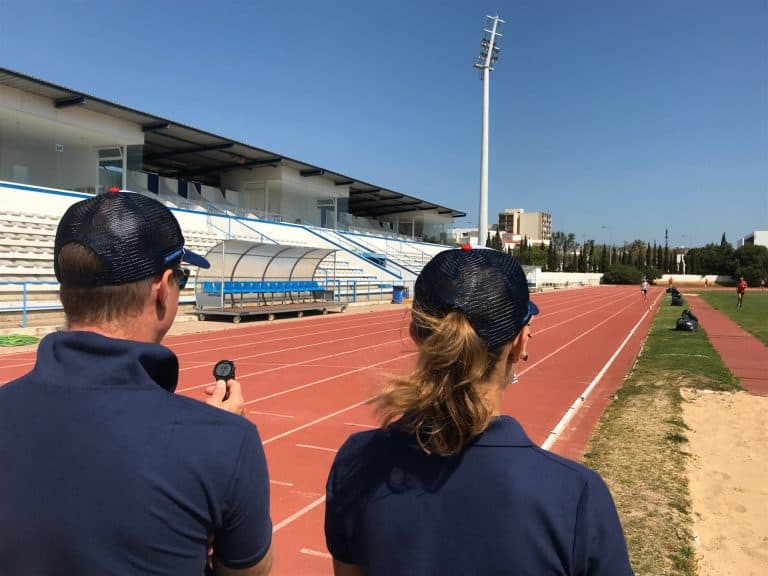In the realm of sport and performance psychology, Dr. Ed Garrett, PsyD, BCMHC, CH-C, stands out. Not only for his extensive experience but also for his innovative application of sporting tools and concepts to benefit individuals and organizations outside of the sporting context. Creating an intriguing crossover between high-performance sport and medical industries, Dr. Garrett shared with us the common drivers in both.
As the Director of Sport and Performance Psychology and a tenured professor at California Baptist University (CBU), Dr. Garrett’s career has been deeply intertwined with athletics. Going beyond his role teaching the next generation of Sport Psychologists in the classroom at CBU, his consulting work traditionally focused on collegiate athletes, offering insights into team dynamics, performance optimization, and behavior modification. However, his ability to translate performance across contexts has proved more than effective, working with numerous medical teams to support their development and ability to perform in high-pressure environments, cohesively.
Sharing insights into his consulting approach, he added,
“I have found great success taking athletics and translating it, using it as a foundation when working with corporations, it speaks to everybody, whether they played [sport] or not is irrelevant. Chances are they’ve got a son, daughter, aunt, uncle, cousin, a niece, or a nephew that plays sports.”
Continuing he said,
“I’ve noticed within sport performance psychology, that we are not the only ones who use terms like win, challenges, and obstacles, they’re used in corporate America. Athletics is a universal language.”
“Every Monday morning, whether you’re in Australia or the States someone’s at the water cooler going, ‘Did you see the game?’ and whether they are talking about the Red Sox, the Dodgers, the Rams, or a game of cricket, the language is universal,”.
The universalities do not end with shared passions, Dr. Garrett has observed that his clients, much like athletes, thrive when they understand their own behavior and the behavior of their colleagues. Dr. Garrett explained;
“Sport teaches us a lot about teamwork and communication. Those lessons can be applied to any setting, whether it’s a hospital or a boardroom,”
This is why a key foundation to Dr. Garrett’s work with his students, athletes, coaches, and private sector clients is developing this self-awareness of their own behavior and the behaviors of others around them. To gain a big picture understanding of the key features of our natural behavior, our strengths, preference for pace, style of communicating and building relationships, Dr. Garrett relies on Athlete Assessments’ DISC Profiles for his clients in sport, and the Team8 DISC Profiles in contexts outside of sport. Dr. Garrett became trained and accredited in the use of Athlete Assessments and Team8’s DISC Profiles, which provides him with the tools and expertise to integrate into his client work.
In addition to providing insights into our most preferred behaviors (we call this your natural style), Athlete Assessments and Team8’s DISC Profiles also capture the adapted profile which reflects how we behave in a workplace, or an environment where we are playing a certain role.
Dr. Garrett extended this work with DISC Profiling to use with medical institutions, particularly Loma Linda University Children’s Hospital and Riverside University Health Systems, two large hospitals in Southern California. “I’ve probably done over 300 DISC assessments with Loma Linda,” he shared. His goal in these settings is to reduce stress and anxiety among medical staff by helping them understand their natural and adaptive behaviors—insights they can apply both at home and in their high-pressure work environments.
The results have been transformative and according to Dr. Garrett, one of the most impactful aspects of using DISC in the medical community, has been helping healthcare professionals recognize the behavioral dynamics in patient interactions.
“When medical staff walk into a room, they’re not just treating little Johnny—they’re also dealing with his mom, dad, aunt, and uncle. They need to read and analyze behaviors quickly, and DISC helps them do that.”
Dr. Garrett also noted how the tool has helped medical teams build better internal relationships. Understanding each other’s DISC Profiles allows colleagues to defuse conflicts and improve team communication.
Emphasizing a key point, Dr. Garrett added,
“I use Myers Briggs, Big Five, Enneagrams, they are all personality assessments; and I stress that DISC is focused on behavior. One of the things I love about DISC is the potential for improvement. We’re not just saying ‘here’s your score’, we’re saying based on these scores, here’s some areas to focus on this month that will improve your understanding of behavior.”
In debriefing clients one-on-one, Dr. Garrett asks them to share their report’s communication strategy at home, in particular, the Do’s and Don’ts of communication with their style. He reiterates the importance of being happy at home and its influence on the rest of life.
He shares his knowledge of each style with clients, explaining
“No supervisor loves having to rehire immediately, that’s just a burden, they want people to stay. So, when I’m meeting one-on-one with supervisors, we really reenforce what each behavioral style needs and wants. We go over things to look for and be cautious of when you’re trying to motivate others.”
In addition to working with individuals, Dr. Garrett explains that when he conducts DISC within larger groups, on the final session he pairs the styles up; Dominance Styles with the other ‘D’s’, Influence Styles with the other ‘I’s, and so on. And people see that even though they can be completely different; from genetic make-up, to socioeconomic background, to gender, they process the same way behaviorally. They can appreciate what each other is going through, how they feel and react based on their behavioral preferences.
The language of behavioral analysis, DISC, becomes engrained in the organizations and teams Dr. Garrett works with, and he recalled how it happened at Loma Linda.
“I walked into an office and I heard two people talking and one person shouts out, ‘Oh don’t worry about that. She’s just an ‘I’. Let her go. She’s going to go ahead and talk’. DISC has become a language, its own little culture.”
Dr. Garrett’s work with DISC isn’t just about helping others—it has also enhanced his own practice as a psychologist.
“I see things through the lens of the D, I, S, and C. Observation is key in psychology, and DISC allows me to better read and understand my clients, whether they’re athletes or medical professionals.”
As Dr. Garrett continues his work with both athletic and medical teams, he sees a growing potential for DISC Profiling to be applied in even more diverse settings.
“I teach my students to think beyond sport psychology—there are so many other areas where these principles can be applied. Whether it’s the military, corporate teams, or medical institutions, DISC has proven to be a powerful tool.”
For Dr. Garrett, the simplicity of DISC is one of its greatest strength, sharing, “People appreciate that it’s easy to understand. It breaks things down into four categories, which makes it digestible without sacrificing the richness and complexity of the assessment.”
Dr. Garrett is adamant, DISC is a universal framework for understanding and improving human behavior, no matter the context. As he continues to push the boundaries of performance psychology, it’s clear that his insights will continue to benefit both the athletic and medical communities for years to come. Concluded he said,
“At the end of the day, understanding behavior is the key to improving performance—in any field.”
Where to from here?
If like Dr. Garrett, you are a Sport Psychologist or Mental Performance Consultant looking for ways to enhance the self-awareness and development of your clients, using a reliable and validated tool, Athlete Assessments offers accreditation training in the use of our DISC Profiles. Take your performance tool-kit to the next level with DISC Profiles tailored specifically for sport (and business too with our Team8 DISC Profiles, if relevant to your clients). Find out more and contact us.
Recommended Articles
Dr. Megan Buning, CMPC, on Empowering Coaches, Game Officials, and Teams with Mental Performance Skills and the Practical Application of DISC Profiling.
Head Coach, Abbey Sutherland, and Mental Performance Consultant and Sport Psychologist, Cody Newton, on the importance of collaborative relationships and role modelling a foundation of trust for your team’s development.
Brian Alexander, Athlete Mental Skills Coach, on the use of DISC Profiling within his holistic approach to athlete development.









